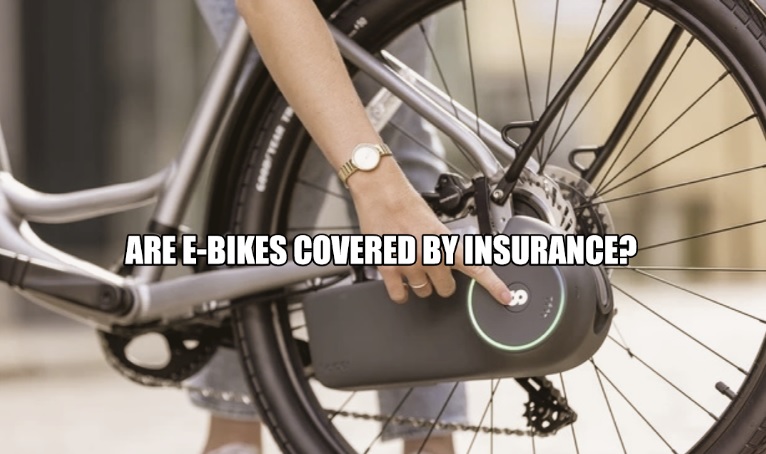Are E-Bikes Covered by Insurance?

As more people embrace e-bikes for commuting and recreation, questions arise about whether these vehicles are covered by insurance. In this blog post, we will explore the topic of e-bike insurance and shed light on the various factors to consider when it comes to coverage.
E-Bikes and Insurance:
Insurance coverage for e-bikes can vary depending on factors such as the type of insurance policy, jurisdiction, and the specific classification of the e-bike.
Homeowner’s or Renter’s Insurance:
If you own or rent a property, your homeowner’s or renter’s insurance policy might offer coverage for e-bikes. These policies generally provide coverage for personal property, including bicycles. However, it’s important to review the terms and conditions of your policy to determine if e-bikes are explicitly covered and if there are any limitations or exclusions. Some policies may require additional endorsements or have specific coverage limits for certain types of personal property, including e-bikes.
Bicycle Insurance:
For more comprehensive coverage tailored specifically to bicycles, including e-bikes, specialized bicycle insurance policies are available in some regions. These policies may offer protection against theft, damage, and liability related to e-bike usage. Bicycle insurance often provides broader coverage than homeowner’s or renter’s insurance and may even include benefits such as coverage during races or events. To ensure your e-bike is covered adequately, it’s important to carefully review the terms of the policy, including any specific e-bike requirements or coverage limitations.
Auto Insurance:
In general, standard auto insurance policies do not cover e-bikes. Auto insurance is typically designed to provide coverage for motor vehicles and may exclude non-motorized modes of transportation such as bicycles. However, if your e-bike falls under the classification of a moped or motorized scooter according to local regulations, it may require registration and insurance coverage similar to a motor vehicle. It’s crucial to check with your local Department of Motor Vehicles or relevant authority to understand the insurance requirements specific to e-bikes classified as mopeds or motorized scooters in your jurisdiction.
Liability Insurance:
Another important aspect of e-bike insurance to consider is liability coverage. Liability insurance provides protection in case you cause injury or property damage to someone else while riding your e-bike. Some homeowner’s or renter’s insurance policies may include liability coverage that extends to e-bike usage, but it’s essential to verify the coverage limits and any exclusions that may apply. Liability coverage can be particularly important in case of accidents where you are deemed at fault, helping to cover legal fees, medical expenses, and damages.
Factors to Consider for E-Bike Insurance:
When considering insurance coverage for your e-bike, there are a few additional factors to keep in mind:
Value of the E-Bike:
The value of your e-bike plays a significant role in insurance coverage. Higher-priced e-bikes may require additional coverage or have higher deductibles. It is essential to accurately assess the value of your e-bike when selecting or reviewing insurance policies to ensure adequate coverage in the event of theft, damage, or loss.
Usage and Location:
The way you use your e-bike and the location where you primarily ride can impact insurance coverage. If you use your e-bike for commuting in busy urban areas, you may want to consider coverage that includes protection against accidents, collisions, and theft. Additionally, if you frequently ride in areas with higher crime rates, comprehensive coverage becomes more crucial.
Additional Coverage Options:
Insurance providers may offer additional coverage options that can enhance the protection for your e-bike. These options can include coverage for accessories such as bike racks, helmets, or damage caused during transportation. Reviewing the available options and customizing your policy to fit your specific needs can provide added peace of mind.
Seek Professional Advice:
Given the diverse insurance landscape and varying regulations, seeking professional advice from an insurance agent or broker experienced in e-bike coverage can be beneficial. They can help you navigate the intricacies of insurance policies, explain specific terms and conditions, and assist you in finding the most suitable coverage for your e-bike.
Conclusion:
Insurance coverage for e-bikes can vary depending on the type of insurance policy, jurisdiction, and specific classification of the e-bike. While homeowner’s or renter’s insurance policies may provide some coverage, specialized bicycle insurance policies offer more comprehensive protection tailored to the needs of e-bike riders. Auto insurance generally does not cover e-bikes unless they meet specific requirements for motorized vehicles. Understanding the details of your insurance coverage, considering additional coverage options, and seeking professional advice are all essential steps in ensuring adequate protection for your e-bike. Remember, while insurance coverage can provide financial security, responsible riding, adherence to local regulations, and prioritizing safety should always be a top priority.
